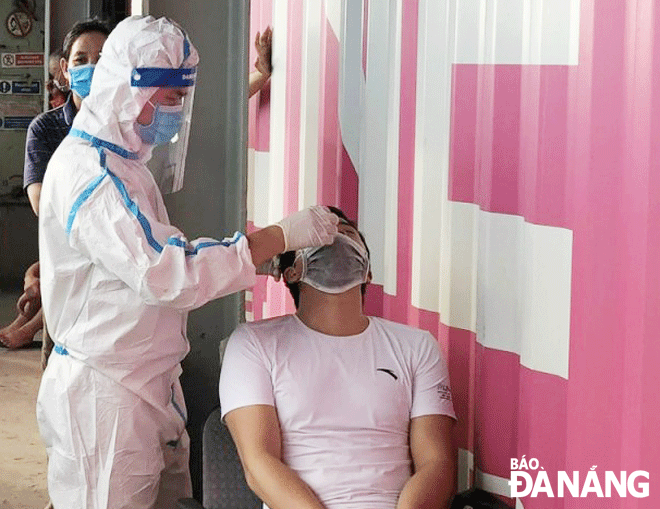What you should know about taking an at-home coronavirus test
In the light of a surge in the number of COVID-19 cases, many people across Da Nang are seen using rapid antigen test kits for the detection of SARS-CoV-2 infection at home. After receiving positive results for SARS-CoV-2, they continue to visit medical facilities in the city to conduct real-time RT-PCR tests.
However, according to the Da Nang Centre for Disease Control (CDC Da Nang), it is not necessary to take a rapid COVID-19 test every day and conduct RT-PCR test after having a positive rapid test result.
 |
| A medical worker conducting COVID-19 testing for residents of Son Tra District. Photo: DOAN QUANG |
Getting tested when you develop symptoms of COVID-19
According to CDC Da Nang, if a fully vaccinated person is exposed to a confirmed COVID-19 case but has no symptoms, they should wait five to seven days after exposure before getting a rapid antigen test.
If you are too worried because of living with a pregnant member or a person with underlying medical conditions, you should first follow the 5K recommendations of the Vietnamese Ministry of Health and wait four days after being exposed to confirmed COVID-19 case to conduct tests. If your COVID-19 test result is negative, you can test again on the 7th day for peace of mind.
As for other cases, it is only necessary to test when there are suspicious symptoms of COVID-19 such as runny nose, cough, fever, body aches, etc. When there is a positive rapid test, people do not necessarily need to take an RT-PCR test.
Currently, buying test kits is easy as there are many variations to choose from, and each of them will have different procedures and operations. Usually on each test kits there are instructions for use or buyers can ask the pharmacies on how to use self-test kits properly.
Also according to CDC Da Nang, faint or bold lines on COVID-19 antigen test results do not indicate severe or mild disease, more or less virus as many people speculate.
Is it safe if a person test negative after short-day COVID isolation?
According to the Ministry of Health-issued Decision No. 250 dated January 28, 2022, people with no COVID-19 symptoms or mild symptoms who are eligible for isolation and treatment at home can leave isolation if they isolate for 7 days and have negative rapid test result. The rapid antigen test for SARS- CoV-2 should be conducted by medical staff or by the patient under the supervision of medical staff in direct or indirect forms via remote means.
If people who still test positive for COVID-19 after 7 days, self-isolation period will increase to 10 full days for those who have fully vaccinated and to 14 full days for those who have not received two doses of a COVID-19 vaccine.
As for patients with COVID-19 who are hospitalised and treated in medical facilities, the period of isolation and treatment at medical facilities is at least 5 days, and clinical symptoms are better and there is no symptom of fever 3 days or more before discharge date. Also, patients are required to have negative Real-time RT-PCR test results for SARS-CoV-2 or low viral concentration (Ct ≥ 30, any specific gene) or a negative rapid antigen test for SARS- CoV-2.
If the real-time RT-PCR test result is positive for a high viral concentration (Ct < 30, any specific gene) or the antigen rapid test is still positive for SARS-CoV-2, patient continues to isolate for full 10 days (not necessarily re-testing).
After being discharged from the hospital, patients self-monitor their health at home for 7 full days and take body temperature 2 times/day. If the body temperature is higher than 38 degrees Celsius in two consecutive measurements or there are any abnormal clinical signs, it is necessary to notify the local medical facility for timely examination and treatment.
For COVID-19 patients with underlying diseases or comorbidities: The period of isolation and treatment at medical facilities is at least 5 days, after the clinical symptoms of COVID-19 disease improve greatly reduce and eliminate fever (without antipyretic drugs) for 3 days or more; have a negative Real-time RT-PCR test for SARS-CoV-2, or a low viral load (Ct 30, any specific gene) or a negative rapid antigen test for SARS -CoV-2, the patient is discharged from the hospital or transferred to another facility or the ward for the treatment of comorbidities or the ward for the treatment of underlying diseases (if necessary) of that ward for further treatment and screening and monitoring according to regulations.
If the real-time RT-PCR test result is positive for a high viral concentration (Ct < 30, any specific gene), or the antigen rapid test is still positive for SARS-CoV-2, patients with COVID-19 continue to isolate for 10 full days (not necessarily re-testing).
Reporting by THANH TINH - Translating by M.DUNG